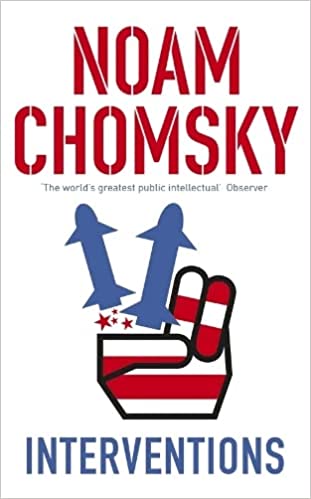Newly released
This book is new and will be uploaded as soon as it becomes available to us and if we secure the necessary publishing rights.

Interventions Book PDF
(0)
Author:
Noam ChomskyNumber Of Reads:
57
Language:
English
Category:
fieldsSection:
Pages:
274
Quality:
excellent
Views:
779
Quate
Review
Save
Share
Book Description
Interventions by Noam Chomsky is getting new press after the Pentagon banned the book from Guantanamo Bay's prison library. The Miami Herald broke the story on October 11, 2009 and stories followed in The Washington Independent, the Boston Herald, and other outlets. Democracy Now! picked up the story on October 13: “Published in 2007, Interventions compiles a series of Chomsky's columns. The Pentagon has refused to explain why the book has been barred.” “Chomsky is a global phenomenon . . . perhaps the most widely read voice on foreign policy on the planet.”—The New York Times Book Review Interventions is Noam Chomsky at his best. Not since his all-time best-selling title, 9/11, published in the Open Media series in 2001, have readers had a timely, short, easy-to-read, affordable Chomsky. Unlike 9/11, Interventions is a writerly work—a series of more than thirty tightly argued essays aimed at various aspects of US power and politics in the post-9/11 world. While critical of US military interventions around the globe, each piece in the book is in itself an intellectual intervention aimed at raising public ire about the consequences of US use of power at home and abroad. Interventions’ subjects span from 9/11 and the Iraq war to Social Security and Intelligent Design, South America and Asia, the Israeli occupation of Palestine and the election of Hamas, Hurricane Katrina, and the US concept of “just war.” According to BusinessWeek, “With relentless logic, Chomsky bids us to listen closely to what our leaders tell us—and to discern what they are leaving out. . . . Agree with him or not, we lose out by not listening.” Chomsky’s Interventions delivers what readers want: an accessible set of skeleton keys for opening up a wide range of global issues dominating today’s political landscape. Noam Chomsky is the critically acclaimed author of many books, including Hegemony or Survival, Imperial Ambitions, Failed States, Manufacturing Consent, and Media Control.
Noam Chomsky
Fram Noam Chomsky (born December 7, 1928 Philadelphia, Pennsylvania) is an American professor of linguist and philosopher, as well as cognitive scientist, logician, historian, critic, and political activist. He is Professor Emeritus of Linguistics in the Department of Linguistics and Philosophy at MIT, where he has worked for more than 50 years. In addition to his work in linguistics, Chomsky has written on war, politics, and the media and is the author of more than 100 books. According to the 1992 Art and Human Sciences Reference List, Chomsky was cited more than any living scholar from 1980 to 1992, and ranked as the eighth most cited reference ever in a list that includes the Bible, Karl Marx, and others. Chomsky has been described as a cultural preeminent, having been voted as the "world's leading intellectual" in a 2005 poll. Chomsky is also described as the "father of modern linguistics" and is considered a major figure in analytic philosophy. His work has influenced fields such as computer science, mathematics, and psychology. . He is also credited with establishing the theory of generative grammar, which is often considered the most important contribution to the field of theoretical linguistics in the twentieth century. He is also credited with establishing what became known as the Chomsky hierarchy, the theory of universal grammar, and the Chomsky-Schützenberger theory. After the publication of his first book on linguistics, Chomsky became a prominent critic of the Vietnam War and has since continued to publish his critical books on politics. He is best known for his criticism of US foreign policy, state capitalism, and the general news media. His criticism of the media, which he co-wrote with Edward Hermann, is included in The Deference Industry: The Political Economy of Mass Media (1988) is an analysis that crystallizes a theory of the propaganda model for the study of media. Chomsky describes his views as "fairly anarcho-traditionalism with its origins in the Enlightenment and classical liberalism" sometimes identified with anarcho-syndicalism and libertarian socialism. He is also considered a key theoretician of the left wing of American politics. He is also credited with establishing what became known as Chomsky's hierarchy, a classification of formal languages according to their generative capacity. In addition to his work in linguistics, Chomsky is widely known as a political activist, and for his criticism of the foreign policy of the United States and other governments. Chomsky describes himself as a libertarian socialist, a sympathetic anarchist who is a member of the world's industrial workers' union and is often considered a key theorist of the left wing of American politics. According to the Arts and Humanities Reference Index, between 1980 and 1992 Chomsky was cited as a reference more than any other living person, and as the eighth person ever.
Book Currently Unavailable
This book is currently unavailable for publication. We obtained it under a Creative Commons license, but the author or publisher has not granted permission to publish it.
Rate Now
5 Stars
4 Stars
3 Stars
2 Stars
1 Stars
Interventions Quotes
Top Rated
Latest
Quate
Be the first to leave a quote and earn 10 points
instead of 3
Comments
Be the first to leave a comment and earn 5 points
instead of 3